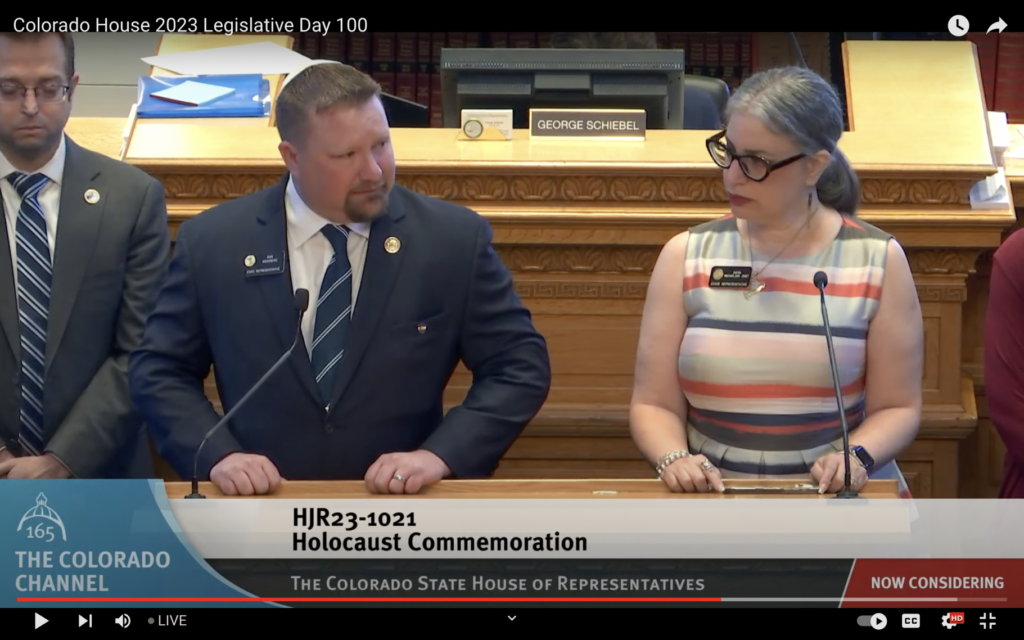Q&A with Mark Dillen | Rallying support, raising awareness at Ukrainians of Colorado
Mark Dillen, public affairs director at Ukrainians of Colorado, doesn’t trace his ancestry to the embattled country — “I’m a French, Irish, American kid from Detroit,” he says with a chuckle — but his wife is of Ukrainian descent, and Dillen’s tour as a foreign service officer with the U.S. State Department included posts to embassies in central Europe and the former Soviet Union.
The organization has stepped up its activities since early 2022, when Russia invaded Ukraine, splitting its work between raising humanitarian aid to send to Ukraine and stateside policy advocacy, particularly as congressional support for the U.S. ally appeared to have stalled late last year, as the country’s devastating war with Russia continues.
Among its activities this year, Ukrainians of Colorado organized a rally at the State Capitol to mark the second anniversary of the invasion, held an Easter market in East Denver with cooking classes and an egg hunt, and threw a late summer Ukrainian Festival at Belmar Park in Lakewood, complete with music, arts and crafts, Eastern European delicacies and a beer garden. The group also helped sponsor last month’s visit to Colorado from Ukrainian journalists, who held a panel discussion titled “Frontline Reporting from Occupied Territories” at the Denver Press Club.
Dillen recently spoke with Colorado Politics about his work with the organization. Our interview has been edited for length and clarity.
Colorado Politics: How did you become involved with Ukrainians of Colorado?
Mark Dillen: It’s been a lifelong professional and personal interest. I’ve been to Ukraine many times over the years, and my wife is of Ukrainian heritage. She was born in the United States, but her parents emigrated to the United States. I started off in the Foreign Service when it was the Soviet Union and worked in Moscow and traveled throughout the USSR. Then after the breakup of the Soviet Union, I turned to issues related to Ukraine and other new independent countries.
So over the past 30 years, I’ve done things that have been Ukraine-specific. I’ve been an election observer after free elections were taking place, I have been a Fulbright scholar on a couple of occasions, teaching at universities in Ukraine. So Ukraine has definitely been on my scope for quite some time.
My wife’s family went through suffering after World War II, to come to the United States. I found at first the humanitarian argument so compelling — I went to work for one of the resettlement agencies here last year for about six months, helping the Ukrainians who had come over under the United for Ukraine program, helping them to get settled. At the same time, I was getting more involved with the political issues that have to be addressed in order to protect our security and defeat the Russian aggression.
CP: Have you been to Ukraine since the current war started?
Dillen: No. When the invasion happened, my wife and I were in Warsaw, Poland, and of course, we were monitoring the situation very carefully, but the advice being given by our embassy in Kyiv was that it’s too dangerous, don’t come. We have a number of people who have come to Colorado since the full-scale invasion began. We have American Ukrainians who have traveled to Ukraine since then, and we are actively looking at ways that we can extend what we’re doing to Ukraine as soon as conditions permit.
CP: Can you describe what Ukrainians of Colorado does?
Dillen: It’s about half humanitarian — fundraising and and plowing that money that we raise through a variety of different ad hoc individual fundraisers and donations into supplying humanitarian goods to Ukrainians in Ukraine — and the other half is political advocacy, because it’s it’s not just about humanitarian aid, as critical as that is. It’s about military assistance and making sure that everything that the United States could and should do, it does do.
CP: How active was Ukrainians of Colorado before the Russian invasion?
Dillen: Across the United States, about 10 years ago, there were a number of new Ukrainian groups founded — East Coast West Coast, mountain region — and most of them started off with the sense that things are getting serious over there, and we have to draw our community together, but they started off basically as self-help organizations, to help Ukrainians who were already in the United States and had an interest in following things connected with their own culture. It’s really in the last two and a half, three years that everything has changed and the level of activity has gone way up.
CP: You’re launching something called the Colorado Ukrainian PAC? What’s the reason for that?
Dillen: You’ll recall that for about six months in the course of the past year and a half, there was a stalemate on Capitol Hill and the supplemental funding that the Biden administration wanted for Ukraine, including very important military supplies and ammunition, that went nowhere for six months.
We were sitting on the sidelines saying, How is this possible? How is it possible that, due to a stalemate over leadership in the House of Representatives, nothing is happening? And so as a nonprofit 501(c)(3), as a humanitarian organization, there were a lot of things we could do, but a lot of things we couldn’t do, and we felt that we had to get more involved in the political arena. And the PAC is a way to do that.
CP: What do you envision the PAC doing?
Dillen: We want to make endorsements. We want to support and organize public forums, where the issue of American support for Ukraine can be discussed and debated. Eventually, we would like to do advertising campaigns or other media support for the positions that we think are warranted.
CP: You’re traveling to Washington to speak with members of Congress and advocate for legislation and policies that support Ukraine. What’s the argument you make?
Dillen: At this point, it’s a matter of American security. It’s not just a brave, valiant country defeating an aggression from a superpower. It’s because what happens there determines other events and behaviors in the world.
We believe that if Russia is successful in Ukraine, members of NATO will be threatened. In fact, they’re being threatened right now. We believe that the Chinese, who have lined up with the Russians, are looking to see what the world does with Ukraine and judging what they can do in the South China Sea. So we think it’s a matter of American security.
It’s many other things, too. It’s a humanitarian crisis. Millions of people have been displaced amid great human suffering, and genocide against the Ukrainian people has been committed. But beyond that, you can see that America’s security is tied up with what happens outside the United States.
CP: There’s certainly an ascendent strain of politics these days that disagrees with that, that says the United States shouldn’t be involved in overseas conflicts. What’s your response to that?
Dillen: Our answer is, look at American history. The people who are saying that draw parallels that easily recall for us the behavior of American isolationists before World War II and other times in our not too distant past, And those individuals, those political strains, were usually the ones that wound up at the end regretting the positions they had taken, because eventually they came to see that American security is not isolationism.
CP: There’s a sense, though, that public opinion has moved in the opposite direction since the invasion, that support for U.S. military aid has fallen off since then. What happened?
Dillen: I don’t think it’s actually falling off. When people are presented with the facts, the answers they give are generally the same as two and a half years ago. What is different is that, obviously, the world has a lot of distractions. There’s crises and war and conflict in other parts of the world, and it becomes difficult simply to focus enough attention on these unresolved but still critical issues related to Ukraine,
When we look at the (congressional) voting records, we can see that it’s not that the voting record has changed that much over time. The people who opposed aid still oppose aid. The people who favored aid still favor aid. When you ask the question properly, the public, most the public, stands firmly with Ukraine.
CP: Do you get any pushback from the local Russian community?
Dillen: No, we don’t, and here’s where it gets tricky and sometimes subtle. There was an article in The New York Times that talked about mixed families in Ukraine and Russia, where one member of the family has a Russian passport, one member of the family has a Ukrainian passport, and the whole situation is bollixed up.
After the war started, after the full-scale invasion started, hundreds of thousands of Russians left Russia. These were business people. They were younger people. Some of them were highly educated. They left because they realized that if they stayed in their own country, in good conscience, they would have to protest, and if they protested, they would get arrested, and bad things would happen to their family.
So the Russians outside the boundary of Russia feel intimidated by the long arm of the Russian security state, and they see it. They see what has happened to people, even in foreign countries who have protested against Russia. The Russians who are left in Russia are subject to constant propaganda and domination, so even when they start off feeling opposed to what their government does, they often wind up just totally subjugated to what the government forces them to do. So it presents difficulties for the expat community of people tied to Russia. Some of them are frankly ashamed, and they come to our rallies and say, “Please forgive us,” and others are just lying low.
CP: What’s next for Ukrainians of Colorado?
Dillen: We have here in Colorado a documentary filmmaker who has just produced a great and compelling documentary about the war in Ukraine, and we’re going to try to help with the rollout of that movie here in Colorado. So that’s something we’re very much looking forward to. His name is Jordan Campbell, and he’s from Montrose and spent a good deal of time in Ukraine making this film.
CP: The war has been going on now for more than two and a half years, even though it was initially projected from some quarters that Russia would take Kyiv in the first two days. That didn’t happen. Are you hopeful? Is there a resolution in sight?
Dillen: I don’t know if Ukrainians would call themselves hopeful, but they are determined. You know, if you’re defending your own house, you may think, oh, things are not looking good for the defense of my house, but I only have one house, and I have to defend it. And that seems to be the attitude of the Ukrainian community.



